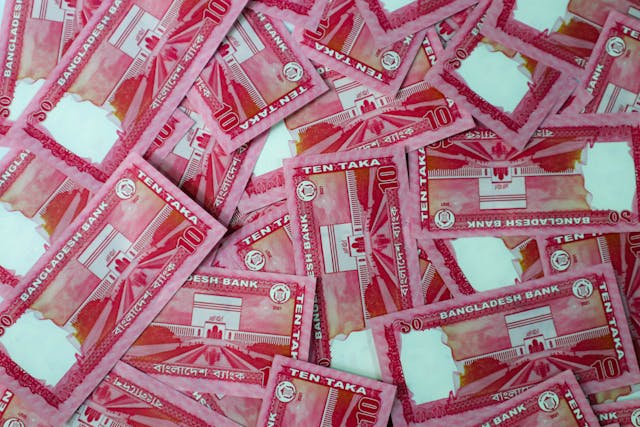The Bangladeshi Taka (৳), abbreviated as BDT, is the official currency of Bangladesh. Introduced in 1972 following the country’s independence, the Taka plays a vital role in daily transactions, international trade, and remittances. Understanding its history, denominations, and exchange mechanisms is essential for anyone interacting with Bangladesh’s economy.
History of the Bangladeshi Taka
After Bangladesh became independent in 1971, the country started using its own money. This money, called the Taka, began on March 4, 1972. It took the place of the Pakistani Rupee with the same value. At first, there were notes for ৳1, ৳5, ৳10, and ৳100. Later, bigger notes like ৳50, ৳500, and ৳1000 were added. This change was to keep up with the country’s growing economy and rising prices.
In May 2024, the Bangladesh Bank set up a crawling peg system. This helped to keep the Taka’s exchange rate steady at 117 BDT for every USD.
Denominations and Design
Banknotes
Bangladeshi banknotes are given out in the following amounts:
- ৳2
- ৳5
- ৳10
- ৳20
- ৳50
- ৳100
- ৳200
- ৳500
- ৳1000
All banknotes have a picture of Bangabandhu Sheikh Mujibur Rahman. He is known as the founding father of Bangladesh. You can also find special notes, like the ৳40 note. It was given out in 2011 to remember the 40th Victory Anniversary. These notes are still being used.
Coins
Coins are available in denominations of:
- ৳1
- ৳2
- ৳5
Lower value coins like poisha are now hard to find because of inflation.
Exchange Rate Trends
In the last six months, the average USD to BDT exchange rate has been about 121.02 BDT for one USD. The rate went up and down at different times, because of the economy and how things changed in the world.
Factors Influencing Exchange Rates
Several factors affect the Taka’s exchange rate:
- Inflation Rates: When prices go up, the Taka becomes less valuable.
- Interest Rates: If Bangladesh and other places have different interest rates, this can change how much the currency is worth.
- Political Stability: What happens in politics can change how sure people feel about putting their money here.
- Trade Balances: If the country buys more than it sells, the Taka can get weaker. Beyond Borders Exchange Rates UK+1Beyond Borders+1
These big economic factors change the way people buy and sell in the foreign exchange market. This can make the value of the Taka go up or down. PLOS
Exchanging Currency
Within Bangladesh
- Banks: Banks offer currency exchange services, and the rates can change from one bank to another.
- Currency Exchange Counters: You can find these at airports and in big cities. They are easy to use, but the fees can be higher.
- Hotels: Some hotels give exchange services, but the rates there might not be good for you.
- ATMs: You can use your international cards at ATMs to get BDT. Make sure you know about the fees that may come with this.
Outside Bangladesh
- Currency Exchange Offices: Most big cities have places where you can change BDT.
- Banks: A few international banks offer services to change BDT.
- ATMs: If you use Bangladeshi cards in other countries, you may have to pay some fees.
Sending Money to Bangladesh
Methods
- Banks: Wire transfers are safe, but they can cost more and might not give you the best rates.
- Money Transfer Services: Companies like Remitly give good rates and different choices to send money. You can send money to bank accounts, mobile wallets, or for cash pick up. Remitly
Considerations
- Exchange Rates: Look at the rates so you can get the most money.
- Fees: Check and see how the fees are with other services.
- Transfer Speed: Some services give you your money right away. Others may take more time.
FAQ: Bangladeshi Taka (BDT)
What is the official currency of Bangladesh?
The official currency is the Bangladeshi Taka, abbreviated as BDT and symbolized by “৳”.
Who issues Bangladeshi currency?
Most banknotes are issued by the Bangladesh Bank, while the Ministry of Finance prints the ৳1 and ৳2 notes.
What are the current denominations of the Taka?
-
Notes: ৳2, ৳5, ৳10, ৳20, ৳50, ৳100, ৳200, ৳500, and ৳1000.
-
Coins: ৳1, ৳2, and ৳5 (lower-value poisha coins are rarely used).
Why does the exchange rate fluctuate?
Exchange rates vary due to inflation, interest rates, political stability, trade balances, and global economic factors.
How can I get Bangladeshi Taka abroad?
You can exchange currency at banks, currency exchange offices, or ATMs that support international withdrawals.
Is it better to exchange money at the airport or in the city?
Airport counters are convenient but often charge higher fees and offer lower exchange rates. City exchange offices usually offer better deals.


